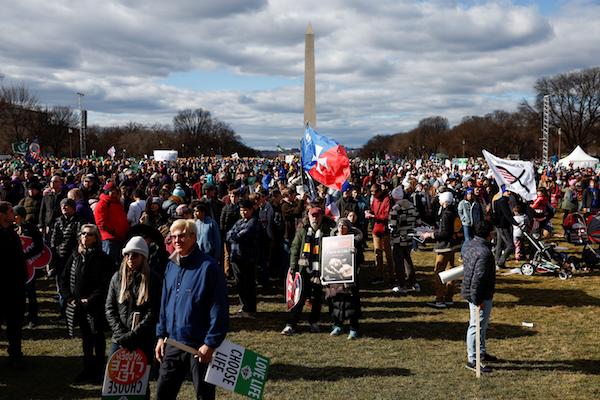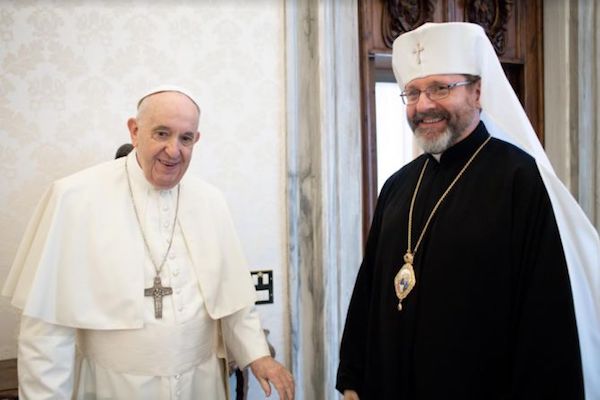Ukraine's Greek Catholic archbishop has marked National Unity Day by reminding citizens that their capacity to defeat Russia and survive depends on co-operating and staying together.
“This national festival naturally became a harbinger of the collapse of the Soviet Union, that prison of nations”, said Major Archbishop Sviatoslav Shevchuk of Kyiv-Halych.
“Today, this unity guarantees our stability and ability to win, defeating an enemy which seeks to tear apart our nation and destroy our statehood. Amid this terrible war's suffering, we wish to tell the whole world there is one united and independent Ukraine, which is surviving, fighting and praying”.
The Church leader issued the message on Sunday after joining other religious leaders at the funeral of Ukraine's interior minister and 13 others killed last week in a Kyiv helicopter crash, as the European Union announced a new 500 million-euro arms package amid disputes over the supply of Western tanks to the war-ravaged country.
He said a “single, independent, free and united state” had been proclaimed in 1919 after centuries of division “between various states and empires”, and reaffirmed in 1990 as the Soviet Union fell apart.
Preaching in Moscow the same day, however, Russia’s Orthodox patriarch also called for national unity, and urged priests and parishes to do more to give strength to soldiers fighting against Ukraine “when the order to attack is given”.
“Even today, when Russia is a superpower with powerful weapons, we must maintain internal strength, and be united and truly strong both economically and politically”, Patriarch Kirill told listeners in Moscow’s Epiphany cathedral.
“The Western world has turned against us, because we offer an alternative which is highly attractive.
“Russia, which rejects the worst manifestations of globalisation, has become a beacon for the world, a country exemplifying loyalty to traditional values such as family, duty and patriotism ... We are really ahead with our ideas, our goals and our faith.”
The contrasting appeals came as Kyiv parliamentarians prepared to debate government legislation to ban communities belonging to Ukraine's Moscow-linked Orthodox church, the UOC, because of their affiliation “with centres in a state carrying out armed aggression against Ukraine”.
Speaking last week during a Security Council meeting convened by Russia, the United Nations' Assistant Secretary-General for Human Rights, Ilze Brands Kehris, expressed concern for religious rights if the ban went ahead, although the UOC insisted in a statement it had not requested “assistance in protecting its rights” from Moscow.
Meanwhile, in a separate Security Council appeal, co-signed by other Christian, Muslim and Jewish leaders, Archbishop Shevchuk said religious freedom had been one of the “first targets” of Russia's invaders, who had destroyed or desecrated over 270 religious buildings, torturing and killing dozens of clergy from all faiths.
He added that Ukraine's achievements in providing freedom of conscience were recognised worldwide, and said other countries could best ensure this survived by helping the country resist Russia's invasion, “which brings death, slavery, ignorance and religious oppression”.
Ukrainian religious leaders were expected to discuss their country's plight this week with the Pope, who again urged prayers on Sunday “for peace for war-torn Ukraine”, but devoted more space in his Angelus message to conflicts in Myanmar, Peru and Cameroon.
In a interview on 19 January with the online Ukrainska Pravda, Archbishop Shevchuk said he had “communicated very intensively” with Pope Francis since Russia's February 2022 invasion, submitting a monthly list of Ukrainian POWs seeking his help, but had also impressed on the pontiff that Ukrainians could not be “forced to reconcile” and seek peace with Russia.
He added that he believed there was a “pro-Russia lobby” in the Vatican, created by Moscow's “investment of large resources” in promoting diplomatic relations and cultural ties, and said Ukraine should respond by ensuring it was also “actively represented” through “high-quality diplomacy”.



 Loading ...
Loading ...